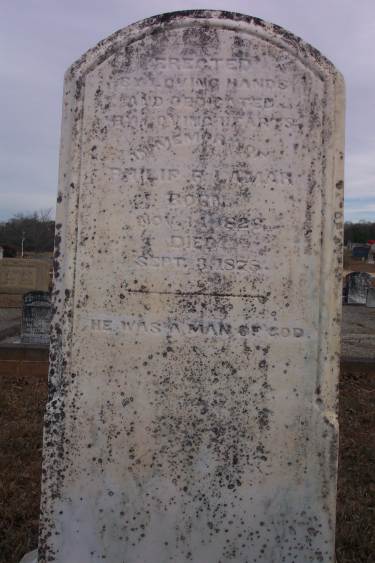Philip F. Lamar
1826-1878
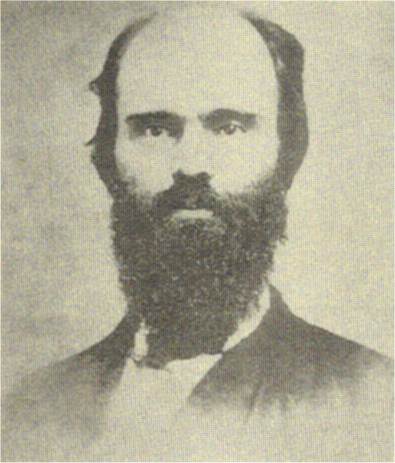
Biographical Sketch of Philip F. Lamar
Philip F. Lamar was born November 14, 1826 in the state of Georgia. He was the eldest son of Philip and Margaret Anthony Lamar. When Philip was six years old, his family moved to Muscogee County, about 10 miles from the town of Columbus, where they were near Mrs. Lamar's parents and other relatives.
His mother was from the Methodist faith. His father was a Baptist. However, it was his mother's influence, along with his mother's brother, Samuel Anthony, a Methodist preacher, who influence young Philip to become a Methodist. He and his two and one-half year younger brother, James Sanford Lamar, read a published communication from Dr. Daniel Hook in a newspaper. Impressed, they invited Dr. Hook to preach at Columbus which then had a population of 6,000 persons. They had "no place of worship, no brethren, and all of the orthodox to contend against." Dr. Hook responded to the invitation, preaching in a hall the young men rented for the purposed. It resulted in a decision by the Lamar brothers to become Christian ministers.
His brother, James attended Bethany College with the kind help of Emily H. Tubman. A year after his arrival there, the Elder Thomas Campbell passed away, January 4th, 1854. James was one of the pallbearers. Later that year he graduated with an A.B. degree and was valedictorian of a class of seventeen. J.S. Lamar was known far and wide in the Restoration Movement.
Though not as educated as his younger brother, Philip was much loved and committed to serving the Lord in the state of Georgia. His first place of preaching was in Griffin, Georgia with a small group of Christians. His contemporaries called him the "Great Evangelist." During the Civil war it was reported that once or twice per month he would go up to the Antioch church, in Clarke County to preach. In 1867 he evangelized in Northeastern Georgia. Sister Tubman was a main benefactor in his continuous efforts. He preached throughout Georgia as state evangelist in 1870 and 1871. He helped to organize churches in the northeastern part of the state. He made his home near Watkinsville. He held strong appreciation for the help the American Christian Missionary Society was able to lend in helping him and the preaching of the gospel in the state of Georgia.
In 1856, The first pre-Civil War periodical definitely known to have been published by Georgia Disciples Of Christ was the Christian Union. The first issue of the monthly, containing 32 pages, published at Augusta, was dated January, 1856. "God Is Love" was subtitle. Publication began with James S. Lamar and A.G. Thomas as editors, Dr. Daniel Hook and Philip F. Lamar as Associate editors.
Congregations which Philip F. Lamar lead in establishing included Christian Chapel (1860), Barrow County; Corinth, 1861, Walton Count; Bethany, now Bogart, 1863, Oconee County; and Galilee, 1868, near Jefferson, Jackson County. He baptized mare than 2000 persons during a ministry of more than 25 years.
After the Civil War, Lamar was supported by the American Christian Missionary Society to continue the work of evangelism in Georgia. Advocating the cooperation of churches to help mission work in various places, Lamar stated at the 19th annual meeting of the ACMS, October, 1866, "I feel that I owe the Society a debt of gratitude which I can never pay. When it was impossible for me to be sustained in the field by the brethren at home the Society sustained me for them. . . ." (p.10) However, in the early stages of the ACMS, it had widespread support by most all Christians in the movement. The later issue of instrumental music in worship evaded the life of P.F. Lamar a few years.
In early 1871, Lamar was Georgia State Evangelist and traveled over 1800 miles, preached 51 times at 21 places and organized or helped to form two congregations.
Philip Lamar was the author of A Practical Grammar published in Philadelphia by Howard Challen. The book began its greatest usefulness at the outbreak of the Civil War. In 1868, he wrote a lengthy sermon that appeared in the Gospel Advocate entitled, "Obedience To The Lord, The Only Safe Ground." (May 21, 1868, pages 401-410)
-Much of this biographical sketch comes from Disciples Of Christ In Georgia, by J. Edward Moseley
![]()
A Tribute to Philip F. Lamar
Galilee's First Preacher
There are few congregations across the United States that can rejoice in 140 years as a congregation and of those, almost none are growing. Galilee is an exception to that rule. Not only are we an old congregation but we are one of the larger congregations in the State of Georgia with the potential of constant growth. On this 140th anniversary as a congregation, I thought it would be great to look back at the beginnings of our congregation and share what we know about our very first preacher—Mr. Philip F. Lamar.
Northeast Georgia, in 1870, was one of the most poverty-stricken areas of the United States. The Civil War had been over for only five years and the South was in ruins. Most of the population was simply trying to raise enough food in order to stay alive through the winter. Carpet Baggers from the north were descending on the South, looking for land bargains that could be bought by paying the back taxes and then ordering those who had lived on the land to leave.
Nationally, Ulysses S. Grant was President, Robert E. Lee died, and Georgia (the last of the Confederate States) was readmitted to the Union. There were thirty seven States that made up the United States plus ten territories and one unorganized territory (Oklahoma). It was in this atmosphere that Philip F. Lamar from Macon, Georgia, came to bring the Restoration plea to our area. He was known as "The Great Evangelist" and started three other churches prior to the establishment of Galilee. Each of these congregations is still alive. They are Chapel Christian in Winder (1860), Corinth Christian Church in Walton County (1861), Bethany, now Bogart Christian Church (1863), and Galilee Christian Church (1868). It appears that work to establish Galilee had begun in 1868 with the setting up of a SundaySchool. However, our congregation was not formally established until 1870 when the charter members were listed.
Philip Lamar was no ordinary preacher. His father was Baptist and his mother was Methodist and he was especially influenced religiously by his mother. Later, along with his brother James S. Lamar, he was led to Restorationism by Dr. Daniel Hook. Upon arriving in the northeast Georgia area, he found that the people here were extremely poor and unable to provide much financial assistance to him and so he had to look elsewhere for help. Much of that assistance came from Mrs.EmilyH.Tubman, a very wealthy Christian woman, who lived in Augusta. During her lifetime, she not only helped Brother Lamar but also gave over $25,000 each year to churches and charity. She built several Christian churches on her own in Georgia and assisted colleges in West Virginia and throughout the West.
In 1871, Lamar was selected as the Georgia State Evangelist and traveled over 1800miles, preached 51 times at 21 places and organized two congregations. During his ministry he is credited with baptizing over 2000 people. He was extremely conservative in his doctrine and was careful to "speak where the Bible speaks and to be silent where the Bible is silent." Because times were so tough in northeast Georgia, he was known to purchase large quantities of potatoes and pork and hand them out to those who had almost nothing. At every revival where he preached, there were 15 to 65 additions. In one report, Lamar reported that there were now over 600 Christians meeting in the northeast Georgia area.
I have often wondered what it would have been like to have listened to BrotherLamar preach. I had learned that the Gospel Advocate had printed one of his sermons but my attempts to locate this message were to no avail. We owe a special thanks to Sharman Hartson, Curator of the Disciples of Christ Historical Society in Nashville, Tennessee, who researched this for us and located the message entitled "Obedience To The Lord, The Only Safe Ground." This message was printed on May21, 1868. We have reprinted this message here for you. The sermon follows the old style of preaching where he sets up several propositions and then proves his text by the use of those propositions. In reading this message, it is my hope that you will become better acquainted with the first minister of our congregation, a man of the Word, an avid worker, and the one who brought the gospel of Christ to this area. Upon those founding roots, we have grown into the church that we are today.
Philip F. Lamar died on September 3, 1878, and is buried in our church cemetery. He was only 51 years of age when he died. On his tombstone are recorded the words, "He Was A Man Of God."
Tom Plank, July 2010
Galilee Christian Church
Jefferson, Georgia
![]()
Obedience to the Lord, the Only Safe Ground
A
Sermon By P.F. Lamar
From The Pages Of The Gospel Advocate
"Hath the Lord as great delight in burnt offerings and sacrifices, as in obeying the voice of the Lord? Behold, to obey is better than sacrifice, and to hearken, than the fat of rams." I Samuel xv: 22
God, though a merciful, is an unyielding judge. His laws cannot be disregarded except at the peril of our salvation. He will accept no partial yielding to his mandates and nothing short of an unconditional surrender to his authority, as the Sovereign Lord of the Universe, will satisfy him. This is the uniform teaching of the Living Oracles from the beginning of Genesis to the final Amen of Revelation. And this introduces us to our first proposition:
I. Partial obedience evidences a rebellious heart, and is, therefore, no obedience at all.
In proof of the correctness and Scripturality of this, our first proposition, we proceed to an accurate, but brief, examination of the context of the above passage. Attention is invited to the command the Lord, through the mouth of Samuel, gave to Saul: "Now go and smite Amalek, and utterly destroy all that they have, and spare them not; but slay man and woman, infant and suckling, ox and sheep, camel and ass." Vs.3. In the execution of the order, no discretion is lodged with Saul — total extermination is demanded. In the seventh, eighth and ninth verses, we have a statement of the execution of this most positive mandate of the lord. With respect to the inhabitants, he slew them all except Agag, King of the Amalekites. With respect to the beasts he reserved a few of the "best sheep and oxen, and of the fatlings and the lambs, and all that was good, and would not utterly destroy them." Is this the obedience offered by one who respects the authority of his Lord? By no means. In so far as it was consonant with this own ideas of propriety, he obeyed the Lord—no further. His was a partial obedience, very good so far as it went, but did not go far enough. He reserved Agag, and a few of the best sheep and oxen, and lost a kingdom. Deceived by the partial obedience he had rendered, he faced the prophet of the Lord, no doubt confidently exclaiming, "I have obeyed the voice of the Lord, and gone the way the Lord sent me." Vs 19. Hear the withering reply of Samuel: "Hath the Lord as great delight in sacrifice as in obeying the voice (word) of the Lord? Behold, to obey is better than sacrifice, and to hearken, than the fat of rams. Because thou has rejected the Word of the Lord, he hath also rejected thee from being king." How fearful to trifle with the authority of Jehovah? In vain may we plead the "voice of the people" or the decrees of Synods, Conferences or Ecclesiastical Conventions. In vain may we plead that our object was only good, as did Saul. No excuse, however plausible, will avail while obedience is within our power. No excuse for disobedience could be more plausible than the one offered by Saul: "The best of the sheep and oxen were spared to sacrifice unto the Lord," and not to promote any secular interests. God did not accept the apology in the case of Saul; He sternly demanded obedience of him, and cannot require less of those who have the superior and clearer light of the Gospel. We are now prepared for another proposition:
II. Acceptable obedience consists in doing precisely what God commands, regardless of popular opinion or the voice of the multitude.
This proposition, so manifestly Scriptural, we need not elaborate. It's Scripturality no lover of God's Word will bring in question. Abel's obedience was acceptable for the simple reason that he did precisely what God commanded. But one question agitated his pious and God-fearing mind: "What does the Lord require at my hand?" That answered, in the simplicity of a child-like and perfect reliance upon the Lord, he did it, and God blessed him in the deed, and though dead, he yet speaks. The lesson he speaks is an important one: Obedience, to be acceptable, must be in the "obedience of faith," or the obedience God prescribes. Any other is solemn mockery and the greatest offense that could be offered to the Majesty of Heaven. The obedience of Abraham, of Noah, and of all illustrious worthies, whose names are gloriously enrolled upon the records of eternity, was in the highest degree acceptable to God, because rendered in the manner prescribed by infinite wisdom: They never argued the subject with God. We never hear them say, "something else will do as well." They brought not their wisdom in competition with the wisdom in Heaven. Theirs was faith: "Speak, Lord, thy servants hear, thy servants will do." They asked not, "what say the people? But what sayest thou, speak, Lord, and we will obey equally regardless of the frowns or the smiles of the multitude. Obedience to the "voice of the people" lost Saul his kingdom, and has consigned its countless thousands to irremediable ruin. The ancient worthies, whose names are so honorable recorded by the pen of inspiration, did precisely what God commanded, and not something as an act of obedience, not commanded. This thought we propose to elaborate and prefer to embody it in a proposition. We, therefore, state as our third proposition the following:
III. A specific injunction to obey a positive law or to perform a definite action prescribed by God as a test of loyalty, amounts to a prohibition of whatever is not commanded as an act of obedience to the given law.
This proposition we maintain is incontrovertibly true because taught by the unerring word of life, light and truth. We argue not that a "positive command is a prohibition of whatever is not commanded." We would not presume to undertake the task of defending such a proposition. But worded as above, we hesitate not to attempt to show its correctness and Scripturality.
1. Our first argument in support of it is based upon Heb. XI:4. "By faith Abel offered unto God a more excellent sacrifice than Cain, by which he obtained witness that he was righteous, God testifying of his gifts; and by it he being dead yet speaketh." Here two "religious" persons are brought to our consideration, each offering a sacrifice to the Lord. The sacrifice offered by one was accepted; that offered by the other was rejected. Why? Both had faith to work—to do something. One was a "tiller of the soil," and why not, he doubtless reasoned, "offer a sacrifice of the fruit of my own labor. So I offer a sacrifice it will be sufficient. God is good; it is more convenient for me, and less expensive to offer of the fruits of the earth. It will be a sacrifice to the Lord. I can see no essentiality in the nature of the sacrifice offer." Thus he doubtless reasoned, and thus he acted. Behold him an outcast and vagabond. Why? Because he offered sacrifice! No. But because it was not the kind of sacrifice that God required. It was not a bloody victim offered up in the simplicity of perfect reliance upon him who commanded it. The character of the sacrifice to be offered was doubtless made known to him. He had not the right to offer any other. His, therefore, was not the "obedience of faith" — for had it been, he would have shed blood, as "without the shedding of blood there could be "no remission," a law of which he could not plead ignorance. What, we ask, was the sin of which Cain was guilty? We answer, doing that as an act of obedience to a positive law, which God had not commanded. Here, then, we see the truth of our proposition. He had received an injunction, in all respects as specific and definite as that given to this brother, to perform a certain action prescribed by God as a test of loyalty; but did something else as an act of obedience to the given law, and thus brought upon himself the disapprobation and frown of his offended God.
2. Our second argument is based upon Numbers XX: 7-12. We notice first, the command: "Take the rod, and gather thou the assembly together, thou and Aaron and speak ye to the rock before their eyes, and it shall give forth its water." This is a positive law to perform a definite and specific action: he was to speak to the rock. We notice in the next place the obedience that was rendered to the above command: "And Moses lifted up his hand and with his rod he smote the rock twice." Was this the obedience he was required to make? No. He smote the rock instead of speaking to it. In the case we are considering there is a specific command, to perform a named action; an action not named is performed as an act of obedience to the given law. Clearly, then it is a case condemned by the proposition we are discussing. Is it condemned by God? If so, the truth and Scripturality of our proposition are maintained. We open the Bible for an answer: "Because ye believed me not . . .Ye shall not bring this congregation into the land which I have given them." Again: "Ye rebelled against my commandment in the desert of Zion in the strife of the congregation to sanctify me at the water before their eyes." Numb XXVII: 14. What command did he rebel against?" As there is but one given command against which he is known to have rebelled, it is safe to conclude; that the named command is the one against which he sinned. The only named command against which he is known to have rebelled was the command to "speak to the rock." This command was disobeyed by smiting it. And although in mercy to the famishing children of Israel, water gushed out of the rock, the disobedient Moses was never permitted to cross the Jordan as the generalissimo of the armies of Israel. To take a glimpse of the land flowing with milk and honey from Pisgah's top was all that was permitted him, where he breathed his last and departed, and though dead he yet speaks a lesson of warning. Let us ponder well, and in the fear of God, that lesson—and do precisely what God commands—no more, no less. This is our only safety.
3. Our third argument is based upon II Chronicles XXVI: 16-21. "But when he (Uzziah) was strong, his heart was lifted up to destruction." What was his sin? It was precisely doing what was not commanded, as an act of obedience to the Lord. The law of the Lord upon the subject was specific and definite. Priests were consecrated to burn incense; kings were not. But was there a positive law that a king of Israel should not burn incense unto the Lord? No such law had been enacted. Then, may not Uzziah burn incense? By no means. For while the law does not state who may not burn incense, it does definitely state who may. Uzziah's sin is named: "He transgressed against the Lord his God." Wherein did he transgress? We answer, by doing that which was not commanded. That Divinely inspired man, called the Apostles of the Gentiles, has informed us that, "whatsoever things were written aforetime, were written for our learning" and "are written for our admonition upon whom the ends of the world are come." Rom. XV: 4. I Cor. X: 11. Thus he wrote to those under the Christian Dispensation, of those who lived under antecedent Dispensations. Let us then take warning from the example of those who brought upon themselves the condemnation of Heaven on account of sin and transgression. We have to deal with the same God, only under new economy. "If the word spoken by angels was steadfast and every transgression and disobedience received a just recompense of reward," how much greater will be our condemnation under an economy of greater light , and that guarantees unto its subjects rights, privileges and immunities unknown to antecedent Dispensations. While positive laws under one economy may not be the same as those of another and different economy, it may safely be assumed that religion in its spirit, in every dispensation, has been the same. Positive laws and ordinances change with economies or dispensations. Still God remains the same, and speaks the same lesson to man. That lesson is faith in and obedience to the laws of the economy under which he may live. If, then, during the Patriarchal and Jewish Dispensations we find God invariably blessing the obedient and cursing with his judgment the disobedient, we may not expect him to change under an economy more spiritual, and that guarantees to its subjects greater privileges. He sternly requires obedience under all economies; he could not require less. If, therefore, an injunction to obey a positive law, or to perform a definite action under the Patriarchal and Jewish Dispensations, amounted to a prohibition of whatever was not commanded as an act of obedience to the given law, we are presuming too far on his mercy, if we expect him to be more lenient to those who disobey his positive laws, under an economy based upon "better promises." He may not send down fire from Heaven to devour them, as he did upon Nadab and Abihu, for doing that "which he commanded them not," he may not send leprosy, as upon Uzziah—but let not the willfully disobedient take comfort—he will visit upon them his more fierce wrath of everlasting banishment from his presence and the glory of his power. Let us, then, with this fearful, but too true statement of a worse doom, or more sore punishment that is in store for us, if we die in willful disobedience to his authority, open the New Testament, and see to apply the principles of the truth of our proposition to the teachings of the Gospel or Christian Scriptures.
Before ascending to His Father, the Lord of life and glory enjoined upon the College of Apostles to "teach all nations, baptizing them into the name of the Father, the Son and the Holy Spirit." Matt.XXVII:19. The same Commission, as recorded by Mark, reads as follows: "Go ye into all the world and preach the Gospel to every creature. He that believeth and is baptized shall be saved; but he that believeth not shall be damned." Mark XVI: 16. Luke gives the following: "Thus it is written, and thus it behooved Christ to suffer and to rise from the dead the third day; and that repentance and remission of sins should be preached in His name among all nations, beginning at Jerusalem." Luke XXIV: 46, 47. These documents contain the Apostolic Commission under which they acted, and show all the authority they possessed to disciple the nations. How were they to "disciple the nations?" By preaching or announcing the good news of salvation. This was their first duty, according to the Commission, as recorded by Matthew and Mark. Their next duty was to baptize the taught. But what kind of taught persons were they to baptize? Mark answers, "he that believes" — and Luke adds repentance to the commission. Clearly, then, the authority under which they acted enjoined upon them the baptism of all penitent believers. They were limited by law. A positive law enacted by the Great Head of the church to baptize a definitely and specifically named subject—a penitent believer. Was the proposition we are arguing true in the case of Cain, of Moses, or Uzziah? If yes, it must apply with equal force to the New Testament. If God, through the Great Head of the Church, has given a specific, injunction to perform a definite action, and that definite action be the baptism of a penitent believer— and the Commission of law, as recorded by Matthew, Mark, Luke and John names no other character, I am circumscribed—I can baptize no one but a penitent believer—for the reason that a positive law to perform a definite action amounts to a prohibition of whatever is not commanded, as an act of obedience to the given law. This conclusion forces itself upon us irresistibly. We see no escape from it. I cannot, as the Catholics did, during the dark ages, baptize horses, church bells and church-houses; under the plea that it is not forbidden—for it is forbidden. It is not only not permitted, but absolutely and forever forbidden by positive enactment. Having thus briefly noticed the commission, as recorded by three inspired men, we turn for a moment to the history of the execution of it, as recorded by that infallible historian, Luke, in the Acts of Apostles. Addressing those who had heard the announcement of the glad tidings, and who were therefore, believers, Peter, acting under the commission and faithful to it, commanded the "pierced in heart" to "repent and be baptized for the remission of sins".* Acts II:38. Again: "But when they believed Phillip preaching the things concerning the Kingdom of God, and the name of Jesus Christ, they were baptized both men and women. Acts VIII: 12. Again: "And when he had brought them into his house, he (the jailor) set meat before them, and rejoiced; believing in the God with all his house. Acts XVI: 34. Here we have a whole household of rejoicing believers—and believers before they were baptized having had "declared unto them the Word of the Lord" (32 vs.) for the very purpose of generating faith.
Philip said to the Ethiopian, "If thou believest with all thy heart thou mayest," i.e., thou mayest be baptized, and go on thy way rejoicing in the realization of pardon. Acts VIII: 36, 37. "Many of the Corinthians hearing, believed and were baptized." Acts XVIII: 8. Cornelius "believed and was baptized." Acts X: 47; XV: 7. Lydia and her household believed and were baptized, and were "comforted" by Paul and Silas. Acts XVI: 14, 40. The Samaritans "believed and were baptized." Their conversion corresponds with the Apostolic Commission: "He that believes and is baptized shall be saved." Stephanas and his household "believed and were baptized"— and only two years after their baptism, if we may credit Dr. Clark, were honorably mentioned by the Apostle, as having "addicted themselves to the ministry to the Saints." I Cor. XVI: 15. The Apostolic Commission, and the narrative of the inspired Luke in the "book of Conversions" or Acts of Apostles, showing how they "Discipled the nations," demonstrably and incontrovertibly prove that the Apostles, true to the law under which they acted, baptized none but penitent believers.
Having ascertained, by an appeal to facts, the subjects of Christian baptism, it seems appropriate under the proposition we are considering, to allude for a moment to the action of baptism. If, as a Christian minister, I have received a positive injunction to perform a definite action, I dare not perform some other action, as an act of obedience to the given law. To do so is prohibited by the law under which I act, and from which I derive whatever authority I possess. With these remarks we proceed to inquire, what is the actions prescribed by the law under which I act, in the performance of the duty, made binding upon me in the Apostolic Commission, to baptize those who "gladly receive the word," or in other words, all who believe in Christ with all their heart, and repent of, and forsake their past sins!
Paul says: "There is one baptism." Eph. IV: 3. What is it? Is it sprinkling? If yes, no one has been baptized who has had water poured upon him. Is it pouring? Then neither sprinkling nor immersing is baptism. Is it immersion? If it is, then to sprinkle or pour water, even upon a proper subject, is not baptism—is not the thing commanded. If the three modes are in the Greek word baptizo then upon the principle that "things that are equal to the same thing, are equal to each other," it follows that no one has been baptized who has not been sprinkled, poured and immersed, since it requires all three of these words to be equal to the word baptize. If the word baptism is equal to immerse, pour and sprinkle, he who has submitted to only one of the actions or modes, has only obeyed a part of the command, and this would be partial obedience, and therefore, no obedience at all. If they are all commanded, they are certainly equally commanded, and my obedience is no obedience at all, unless I submit to them all. Therefore, I must be immersed, and then have water sprinkled and poured upon me, before I can know that I have certainly been baptized. If it be contended that baptism is compliance with any one of the three modes, we reply, if no one of the modes is commanded, obedience to them all, or any one of them, is not a duty. No act of obedience can be acceptable to God, or be done in righteousness, that he has not commanded or in some way required. If no text in the Bible compels me to sprinkle, pour or immerse, then to administer or submit to any one of them is wicked, because doing that which is not commanded. If no text commands immersion, then immersion is not a duty, and he who submits to it is not baptized. So of sprinkling and pouring. Some hold that there is a difference between the thing baptism and its mode; so that though the thing is commanded by the use of the Greek word baptizo — the mode of the thing is left optional with us — is not commanded. According to this there is no Divine authority for any mode or action of baptism. Hence, according to the injunction of the Apostle Paul— "And whatsoever you do in word or deed do all in the name (by the authority) of the Lord Jesus," we are by necessary implication, forbidden to use any mode whatever. And since the thing cannot be secured without mode, we are hence forbidden to be baptized at all."** Such are the absurdities in which those, who maintain that no specific mode (action) is commanded, involve themselves. Let it be remembered, once for all, that baptizo as a verb of action cannot express more than one action. Pouring expresses an action which can never mean sprinkle. As the verb walk can never express the action denoted by the verb ride — so the verb sprinkle can never express the action denoted by the verb immerse. Has the Holy Spirit explained the action indicated by the Greek verb baptizo, and can we, by accepting the explanation, certainly know that we have rendered obedience to the command "be baptized?' We open the Living Oracles for the answer:
1. It is a burial: Therefore we are buried with him (Christ) by baptism into death; that like as Christ was raised up from the dead by the glory of the Father, even so we also should walk in newness of life." Rom. VI: 4.
2. A planting: If we have been planted together in the likeness of his death, we shall be also in the likeness of his resurrection." Rom. VI: 5.
3. A birth: "Except a man be born of water and of the Spirit, he cannot enter the Kingdom of Heaven." John III: 5, 6.
We next notice the places where it was performed. In the Jordan:
1. In the Jordan: "Then went out to him (John) Jerusalem and all Judea, and were baptized of him in Jordan." Matt. III: 5, 6.
2. Where there was much water: "And John also was baptizing in Enon near to Salim, because there was much water there." John III: 23.
3. In the water: "And they went down both into the water, both Philip and the Eunuch; and he baptized him." Acts VIII: 38.
Thus hath the Holy Spirit explained the signification of the Greek verb baptizo in language so plain that none can mistake its meaning: It is the burial of a penitent believer into the name of the Father, of the son, and of the Holy Spirit. May we certainly know that we have submitted to the one baptism, performed the identical action prescribed by the Lord. We answer, unhesitatingly, yes. We may know it; may never have a lingering doubt to disturb the peace and quiet of our conscience, if we will accept the explanations of the Divine Spirit, and submit with all the docility of a little child to the "one immersion." All the doubting belongs to those who submit to and perform something else — which our proposition says, "is prohibited as an act of obedience to the given law." Does not the Bible say so too? Reader, have you been baptized, or are you still living in disobedience to this, the first act of formal obedience to your Lord and Master? How dare you treat his law with contempt? Remember, that obedience to the letter and Spirit of God's Word renders salvation certain, and is, therefore, the only safe ground. To the Romans, Paul said: "Ye have obeyed from the heart that form of doctrine which was delivered you. Being then made free from sin, ye became the servants of righteousness. Rom. VI: 17, 18. The Romans had "obeyed the form of doctrine delivered unto them." What was the doctrine? Paul responds: "I declare unto you the Gospel, how that Christ died for our sins, was buried and rose again the third day, according to the Scriptures." 1 Cor. XV: 1-5. The death, burial and resurrection of Christ, then is the doctrine. What is the form of this doctrine which the Romans had "obeyed" and by which they were at the time of their obedience, "made free from sin?" Paul responds, that having "died" to sin, they had been "buried by baptism" and had "risen" again to walk in newness of life. Clearly, then, the "form" of doctrine which they had obeyed" was their death unto sin, burial with Christ by baptism, and resurrection, to walk in newness of life. In further confirmation of this position, let it be remembered that some of those Romans were present at Pentecost, heard Peter proclaim the death, burial and resurrection of Christ, and were among the first converts to Christianity. Acts II: 10. After hearing the doctrine, pierced in heart, they propound the following question: "Men and brethren what shall we do?" Now, as Paul says, they had "obeyed the form of doctrine delivered unto them," it follows necessarily that Peter's answer to the important question propounded to him, will be identically and precisely the "form of doctrine" he had presented to their consideration. What had he preached? We answer, the death, burial and resurrection of Christ. His answer, then, must embrace a "death, burial and resurrection." And this is precisely what it does embrace. Hear the response: "Repent" — a death unto sin. Act II: 38. Thus, having heard and believed, the Romans, with many others, in response to the command of Peter, "obeyed the form of doctrine delivered unto them" "for the remission of sins" — and arose from the "watery grave" — in the enjoyment of plenary pardon, to "walk in newness of life".
Hear again the Word of the Lord: "And the Word of God increased; and the number of Disciples multiplied in Jerusalem greatly; and a great company of the priests were obedient to the faith." Acts VI:7. What is it to be "obedient to the faith?" It is to do precisely what the Romans did, "obey from the heart (not the doctrine but) the form of doctrine delivered unto us" — by dying to sin, being buried with Christ by baptism, and rising to walk in newness of life. It is to accomplish an object so desirable that the Gospel is "made manifest;" for this alone, the College of Apostles were inspired to reveal its mysteries of secrets. Hear Paul to the Romans: "Now to him that is of power to establish you according to my Gospel, and the preaching of Jesus Christ, according to the revelation of the mystery, which was kept secret since the world began, but now is made manifest, and by the scriptures of the prophets, according to the commandment of the everlasting God, made known to all nations for the obedience of faith." Rom. XVI: 25, 26. "Blessed are they that do his commandments, that they may have right to the tree of life, and enter in through the gates into the city." Rev. XXII: 14. "But wilt thou know, O vain man, that faith without works is dead." "Ye see then how that by works" (the obedience of faith) "a man is justified, and not by faith only." "For as the body without the spirit is dead, so faith without works is dead also." James II: 20, 24, 26. "Not everyone that saith unto me Lord, Lord, shall enter into the Kingdom of heaven; but he that doeth the will of my Father, who is in Heaven." Matt.VII:21.
In the light of these Divine utterances, our only safety is in obedience to the Lord; not a perfect sinless obedience to moral law; but the "obedience of faith." Obedience to the positive institutions of the Gospel is demanded —can be rendered, nor is there in all the Christian Scriptures a solitary promise of present or future salvation to the willfully disobedient. No discretion is left us to select one mandate of the Lord, and attach to it a saving efficacy, while we neglect obedience to other commandments. God has made no difference. He is a Sovereign—and when he speaks, it is for man to hear, believe and obey. He who would willfully neglect obedience to the least command of God, knowing it to be a command, is a rebel against his authority, and would, if he could, dethrone the Judge and rightful Sovereign of the Universe. Trifle not thus with God. Remember Cain; "remember Lot's wife;" remember Uzzah, and Uzziah, Nadab and Abihu, and presume not to trifle with that unyielding Judge, before whom you are destined to stand. Listen not to the "voice of the people"—follow not the multitude. No excuses will avail you if obedience is within your power. No explaining away of God's Word will be permitted in the day of final account. You may thus act and give your conscience momentary ease now; but all this will be of no avail before God. Be alarmed. Have you not often perverted God's Word? Have you not wrested it by warping it to correspond with theories of your own creation—not once named in the Bible: Have you not said that some of his commandments are non-essential? When I think of the Judge before whom you must stand, I am alarmed for you. "Be not deceived; God is not mocked." Make haste, and delay not to "keep his commandments." Throw yourselves into the arms of Jesus. Submit to his righteousness, by submitting to his authority. Stand upon safe ground. If our faith alone can save you, the "obedience of faith" urged upon you will not endanger your salvation. It will render it only the more secure, and will remove all your lingering doubts and harassing fears. Why not occupy undisputed ground. Christ's blood, the procuring cause of pardon, never saved a Herod or a Pontius Pilate. It can only save you by coming to it. Through the "obedience of faith" or compliance with the instrumental means for the enjoyment of pardon, the three thousand at Pentecost, the jailer, Lydia, and a hosts of others, whose names are recorded in the Book of Life, reached his precious blood and obtained salvation. Follow their example, and all will be well. "Behold, to obey is better than sacrifice, and to hearken, than the fat of rams." Obey your Savior without delay, and your soul shall rejoice in the knowledge of salvation—of complete deliverance from past sins. Listen to the "man of sorrows" as he addresses you in the language of tenderness and affection, saying, if you love me keep my commandments." "He that hath my commandments, and keepeth them, he it is that loveth me." "Ye are my friends, if ye do whatsoever I command you." Can you resist the appeals of a bleeding Savior? Can you longer turn a deaf ear to his words? The Spirit says come; the Bride says come; the Son says come; all Heaven and the good earth say come; come and obey—while it is written blessed are they that come—that thus come—that come through the "obedience of faith," doing his commandments, that they may have "right to the tree of life and enter in through the gates into the City."
*This command with the parties of the day, has grown rusty for the want of use. Accustomed to hearing preaching from our earliest recollection, we were twenty-five years of age before we ever heard it quoted by any proclaimer.
**Moses E. Lard, to whom we are indebted for many valuable thoughts on the action of baptism, we quote, without having his excellent Quarterly before us, and may not give his exact language.
-May 21, 1868 Printed in "Gospel Advocate"
Source: Special Thanks to Don Brandon and Tom Plank of Galilee Christian Church who kindly sent this information in for presentation on this website.
![]()
Location Of The Grave Of Philip F. Lamar
Lamar began the work at Galilee in 1868. It is located just southeast of
Jefferson, Georgia in Jackson, County. My wife Jenny and I, along with friends,
Daryl and Mildred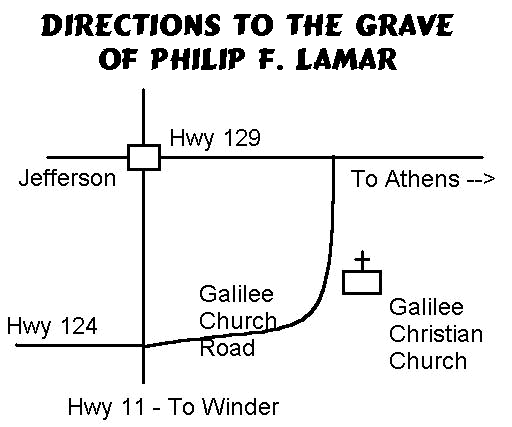 Smith, visited the church graveyard in October, 2001 and took a few pictures of
the grave. To the right is a map that we borrowed from the Galilee Christian
Church website and enhanced a little for our needs. We also found a shot of the
first church building, that we've added here for your convenience.
Smith, visited the church graveyard in October, 2001 and took a few pictures of
the grave. To the right is a map that we borrowed from the Galilee Christian
Church website and enhanced a little for our needs. We also found a shot of the
first church building, that we've added here for your convenience.
Northwest of Atlanta on I-85 you will get off at the Jefferson Exit and go east toward Jefferson on Hwy 129. When you get into Jefferson there are two ways to get there. Either enter Galilee Church Road further south from Hwy 129, or do as we did and go south on Hwy 11 toward Winder and turn left on Galilee Church Rd. When you get to the building and cemetery, you will notice that the older graves are closest to the building. About three of four rows in is the grave of Philip F. Lamar.

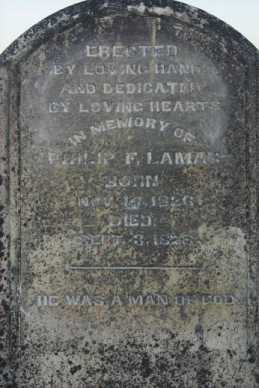
ERECTED
By Loving Hands
And Dedicated
By Loving Hearts
In Memory Of
PHILIP F. LAMAR
Born
Nov. 14, 1826
Died
Sept. 3, 1876
_____________
HE WAS A MAN OF GOD
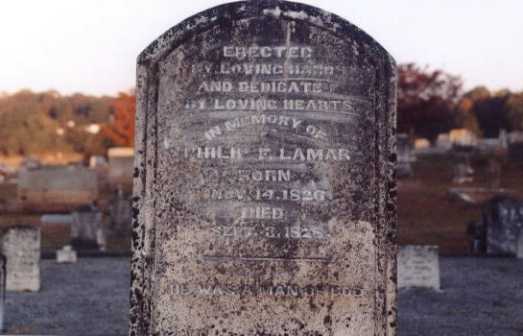
![]()
The Church At Galilee
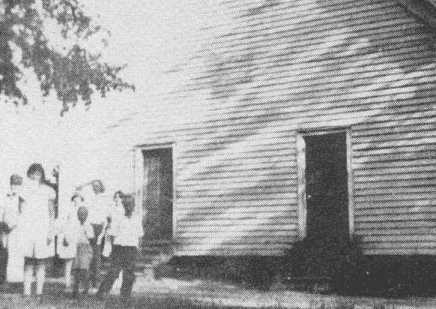
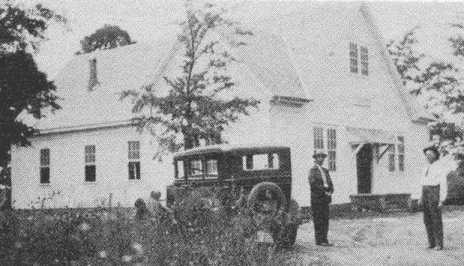
Original Church, c.1870
Expanded, 1929
Special Thanks to Don Brandon, Tom Plank and the good folks at Galilee Christian for supplying the photos you see on this page.
![]()

